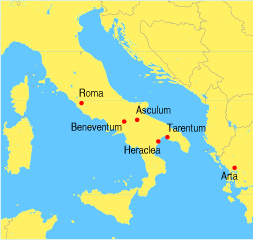Battle of Beneventum (275 BC)
| Battle of Beneventum | |||||||
|---|---|---|---|---|---|---|---|
| Part of the Pyrrhic War | |||||||
 Most important places in the Pyrrhic War | |||||||
| |||||||
| Belligerents | |||||||
| Roman Republic |
Epirus, Magna Graecia | ||||||
| Commanders and leaders | |||||||
| Manius Curius Dentatus | Pyrrhus of Epirus | ||||||
The Battle of Beneventum (275 BC) was the last battle fought between the forces of Pyrrhus of Epirus (without Samnite allies) and the Romans, led by consul Manius Curius Dentatus. It was fought near Benevento, in Southern Italy, and was central to subsequent Roman expansion.
Pyrrhus had been drained by his recent wars in Sicily, and by the earlier Pyrrhic victories over the Romans. Although the battle was inconclusive, he decided to end his campaign in Italy and return to Epirus; as a consequence of this, many modern sources wrongly state that Pyrrhus lost the battle. Pyrrhus' departure resulted in the Samnites finally being conquered, and the eventual fall of Magna Graecia three years later, which resulted in Roman dominance of the Italian peninsula.
The exact numbers are not known. The Epirot force was scattered before the battle and the Romans were able to scare Pyrrhus's war elephants (presumably with a fire arrow) and send them crashing back to the Epirot ranks.
Although they never defeated Pyrrhus on the field, the Romans were able to win a war of attrition against what was the best general of his time, and one of the greatest in antiquity. In doing so, they established themselves as a strong power in the Mediterranean. The Roman battles with Pyrrhus also foreshadowed the superiority of the Roman legion over the Macedonian phalanx, due to the greater mobility of the legion (though many point out the weakening of the cavalry arm in the times of the diadochi). Also, the Hellenistic world would never again have a general like Pyrrhus to challenge the Romans.
